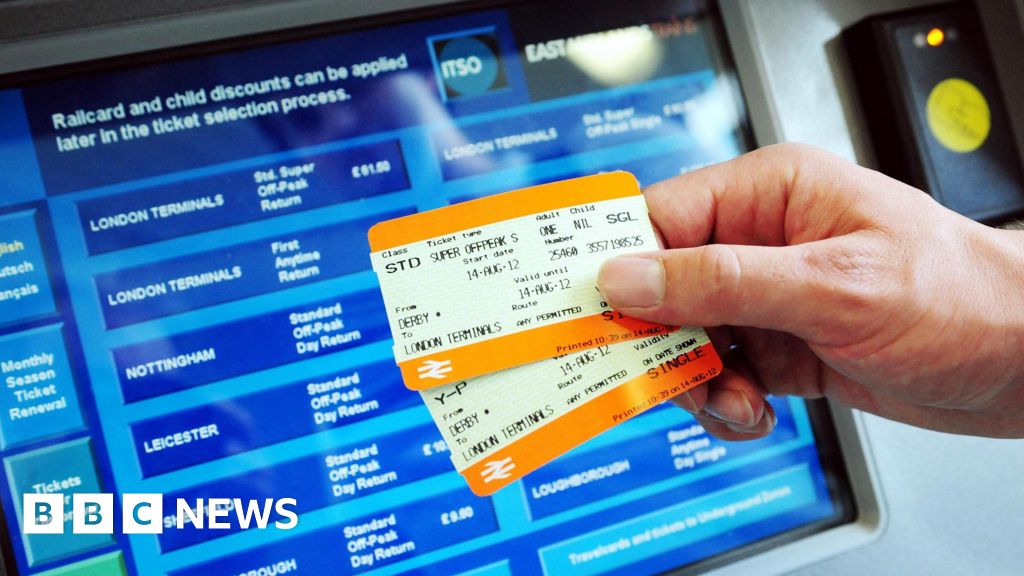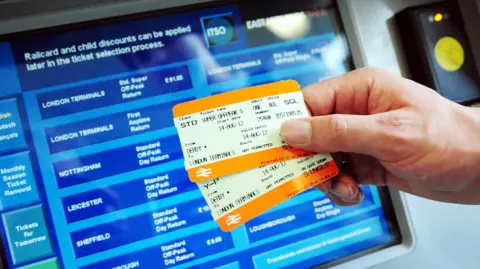Fines and convictions for minor mistakes – how rail tickets confuse passengers

 PA Media
PA MediaDespite what the name suggests, an Anytime train ticket does not always mean you can travel on the railway at any time – if you’re using a young person’s railcard.
Engineering graduate Sam Williamson discovered that earlier this week, when a train company told him he could face criminal prosecution for incorrectly using a ticket which cost him £1.90 less than it should have done.
And there are several other cases being shared on social media with people being told to pay hundreds by courts for underpaying fares by only a few pounds.
Sales agent Cerys Piper told The Bolton News she didn’t even know she was being prosecuted for incorrectly using her 16-25 railcard until contacted by a journalist.
She bought an Anytime Day Return ticket to travel to work in Wigan and used the railcard to get £1.60 off the £4.80 ticket price.
But before 10am, these railcards cannot be used to get discounts on Anytime tickets if the fare is under £12 – which Cerys says she was unaware of. The court issued her a fine of £462.80 and she now has a criminal record.
At the heart of the matter is a ticketing system that customers think is too confusing and feels like it is trying to catch them out.
These are a few of the many difficulties passengers might encounter:
- ‘Anytime’ fares that can only be used at certain times of day depending on the type of railcard discount they have been bought with
- Tickets for a destination that are only valid if you travel via a particular station
- Train companies which let you buy tickets from an onboard conductor on some of their lines but not on others
- Some routes only allowing travel with printed, rather than digital, tickets
Companies say passengers should check rules and regulations, which are freely available for people to read. Customers argue they are not made clear enough when buying tickets to begin with.
Typically a train company will write to a passenger who has been suspected of fare evasion by a conductor.
They will review the circumstances and decide whether to prosecute for evasion, for a byelaw offence – which is much less serious – or take another action, such as settling out of court or dropping the case entirely.
‘Undermining public trust’
Passenger watchdog Transport Focus has pleaded for train companies to treat passengers more fairly when they mistakenly underpay their fares.
“We know from talking to passengers how confusing the current system is – no one thinks you should have to spend ages checking detailed rules and restrictions before getting on a train,” says Alex Robertson, chief executive of Transport Focus.
“This is one of the reasons why we have long argued for the need to simplify fares and ticketing … Passengers must be able to trust that penalties are given only to those who deserve them.”
Chris Annous, from the research organisation More in Common, says their work shows British people are frustrated with public bodies who penalise those who break rules accidentally.
“That train companies are so intensely pursuing those who make minor mistakes when navigating the complicated ticketing process, and not showing the same resolve on improving conditions for passengers, cuts to the heart of why so many feel the country simply isn’t working for ordinary people,” he says.
The government agrees and the Department for Transport has promised “the biggest overhaul of our railways in a generation, including simplifying fares”.
Among the options they are considering are pay as you go and digital season tickets that can be used across the rail network.
Great British Railways
In September, Transport Secretary Louise Haigh outlined the creation of Great British Railways, a new body that will oversee the return of the rail network to public ownership.
The new Labour government believes this will reduce train delays and cancellations as well as simplify fares – but private rail companies warn this will not necessarily fix the industry’s problems.
They point out that the letter to Mr Williamson and the prosecution of Ms Piper were all carried out by Northern, a publicly owned train company.
“Creating an easier ticketing system requires regulatory change by the government and the legislation currently going through Parliament to change who runs the trains won’t fix that,” says Andy Bagnall, chief executive of Rail Partners, which represents private train firms.
“This isn’t a problem that can be solved by simply removing the private sector from the railway.”
A spokesman for Northern says their conductors have “a very difficult role in dealing with repeated and deliberate fare evaders and identifying customers who have made a genuine mistake”.
He adds they understand ticketing is complex and are talking to the government and the wider rail industry about how to simplify fares.
‘Follow London’s system’
A report published earlier this year suggested that a simpler ticketing system would help restore public faith in railways and generate more revenue which could be reinvested in the network to make it better.
It was commissioned by the Rail Industry Association, which represents a variety of companies including train manufacturers, signal makers and ticketing firms.
Sam Bemment, who wrote the report, says the technology for a simple ticketing system already exists but that historically there hasn’t been enough political willpower to put it in place.
“The railway has essentially been a political football,” he explains. “The political cycles mean there has been no leadership or direction as to what we want ticketing to look like.”
He points at London’s contactless payment system for tickets – which works across local railways, the underground and buses – as being a world-leading example of how a good ticketing system functions.
He says such a system might be possible under Great British Railways, even if the body just allows tickets to be used across different rail companies – it doesn’t necessarily need to nationalise them.
“I think when we move to GBR, if we can bring everything under one roof, then you as the passenger have a relationship with the railway instead of all these many corporations.”
The arrangement could mean that all tickets are bought from, and all complaints dealt with, by one organisation – a simpler system than the current one.
“Government and infrastructure move slowly,” adds Mr Bemment. “But this right now seems to be picking up a bit of speed and momentum.”

BBC Radio 4 examines What Are the Railways For? It’s a question which has been ignored in previous reorganisations – which typically take place after a crisis or a disaster. Daniel Brittain travels to Greater Manchester to understand how the rail industry has changed and what its place in Britain’s society might be in the future.
Related
Youth football teams hold minute’s silence for 10-year-old Poppy Atkinson
Youth football teams and grassroots clubs across the country have held a minute’s silence at the start of their games to commemorate a 10-year-old girl who di
Girl’s death sparks minute’s silence at football matches nationwide
10-year-old Poppy Atkinson was killed when she was struck by a car during a training session at Kendal Rugby Club in Cumbria. Clubs from Leeds to London
Liverpool fans’ Uefa claim can be heard in England, judge…
The high court, sitting in Liverpool, heard Uefa had relied upon the principle that English courts will not inquire into the legality of actions by foreign gove
Alan Shearer’s Premier League predictions including Manchester United vs Arsenal
Caption: Alan Shearer?s Premier League predictions credit: Getty / Metro After some impressive results for English sides in Europe the focus is













